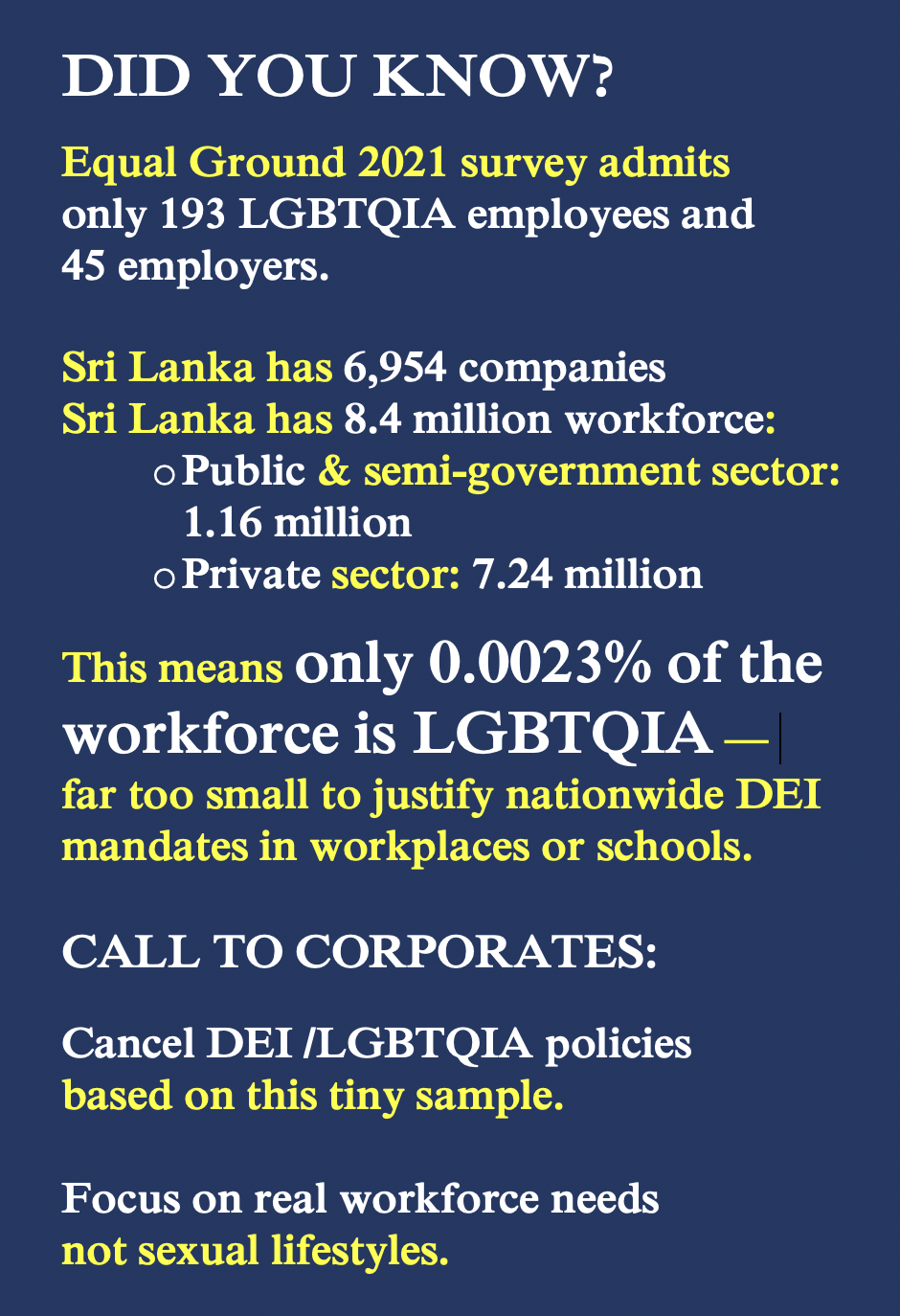Foreign DEI & LGBTQIA Impositions: The Silent Career Bribery of Sri Lanka’s Non-LGBTQIA Workforce

Sri Lanka has long been a nation rooted in law, culture, and tradition. Today, this foundation faces direct assault from foreign-funded DEI and LGBTQIA campaigns, imposed through corporations, NGOs, and even diplomatic channels — in open defiance of our laws, Constitution, and civilizational ethos.
Under Penal Code Sections 365 & 365A, homosexuality is illegal. Gender recognition is strictly male or female, making attempts to normalize LGBTQIA identities through corporate or NGO policies a direct violation of sovereignty and legality. The Supreme Court’s ruling on the Gender Equity Bill 2024 reconfirms that foreign-inspired identity politics cannot override the sovereign will of the Sri Lankan people.
Despite this, U.S., UK, European, and Canadian-linked multinationals, along with local companies, are imposing DEI and LGBTQIA policies on Sri Lankan employees. NGOs are influencing agencies like the Sri Lanka Tourism Development Authority (SLTDA) to promote LGBTQIA tourism agendas as national policy. This occurs even as the Trump administration has rolled back DEI mandates in the United States, yet many U.S.-linked companies continue exporting these policies abroad.
Corporate Imposition vs Sri Lankan Law
International and local companies — including Dialog Axiata, Fortude, MAS Holdings, Nestlé, John Keells Group, Sysco LABS Sri Lanka, Godrej Sri Lanka, HNB Assurance (in collaboration with Diversity Collective Lanka), ECCSL, and Brandix — have publicly posted DEI policies, which in some cases include LGBTQIA-focused elements.
Many corporates claim DEI is neutral or focused solely on gender equality, but globally, DEI explicitly includes sexual orientation and gender identity. In Sri Lanka, HR manuals, workshops, and NGO partnerships make this clear: every DEI initiative is inseparably linked to LGBTQIA policies, regardless of local disclaimers.
It is notable that HR teams, which implemented these programs, did not provide comprehensive workforce data to the CEOs or boards prior to rollout. With accurate statistics on LGBTQIA representation and potential impact researching on global reversals, corporate leadership could have made better informed decisions — or adjusted the scope of these initiatives — thereby avoiding undue pressure on the broader workforce.
Publicly available links to company policies:
John Keels Group (22,250 permanent & non-permanent)
Sysco Labs (831employees)
Fortude (642 in Sri Lanka)
HNB Assurance (1500 employees)
Dialog Axiata (3200 employees)
MAS Holdings (90,040 employees)
Brandix (43,000 employees)
Nestle (822 employees)
Godrej Sri Lanka (150 employees)
European Chamber of Commerce Sri Lanka
These programs often include elements such as:
- LGBTQIA awareness and sensitivity training
- Anti-discrimination rules providing additional protections for LGBTQIA employees
- Workplace accommodations related to sexual orientation or gender identity
Sri Lankan citizens deserve transparency:
- how many employees identify as LGBTQIA?
- Where is the evidence of discrimination that justifies these sweeping policies?
- No independent audit or study has been presented.
Limited Numbers, Overstated Impact
Even LGBTQIA-promoting surveys show the actual workforce impact is minimal.
Equal Ground (2021) surveyed 193 LGBTQIA employees and 45 employers; only 38% of organizations had reporting procedures.
https://www.equal-ground.org/wp-content/uploads/DAP-REPORT-FINAL.pdf
The exaggeration of these NGO figures was such that a Kantar/Equal Ground study (2021) estimated 12% nationally – the Hindu population itself is 12.6% while the Muslim population is just over 10%.
In reality, fewer than 70,000 employees openly identify as LGBTQIA.
Yet DEI policies impose sweeping changes that affect over 99% of non-LGBTQIA staff, causing psychological pressure and career coercion.
Even the Equal Ground survey (2021), which is often cited to justify LGBTQIA workplace policies, surveyed only 193 LGBTQIA employees and 45 employers.
By comparison, just eight major Sri Lankan companies — John Keells, Sysco LABS, Fortude, HNB Assurance, Dialog Axiata, MAS Holdings, Brandix, and Nestlé Lanka — collectively employ over 162,000 staff.
This means the LGBTQIA employees captured by the survey account for less than 0.12% of the workforce of these eight companies. Put differently, the survey sample is roughly 840 times smaller than the combined staff of these employers.
To illustrate further: for every 1,000 employees in these companies, only about 1 person was included in the survey.
Even when extrapolated to the entire Sri Lankan workforce of 8.41 million, the survey represents a mere 0.0023% — an infinitesimal fraction, far too small a base to justify nationwide DEI mandates.
Thus, imported DEI and LGBTQIA policies are being crafted around a tiny fraction of employees, while placing disproportionate psychological and career pressure on the overwhelming 99% majority of non-LGBTQIA staff.
Companies should reassess their policies in proportion to actual workforce needs.
Shouldn’t Sri Lanka’s Labor Ministry protect these non-LGBTQIA employee rights?
These programs put staff in an impossible position: comply with corporate mandates that contradict national law, or risk job loss, denied promotion, or reassignment. By creating selective ‘protected classes,’ companies effectively punish the majority forcing compliance with foreign agendas over the nation’s laws and culture.
Some non-LGBTQIA staff may experience psychological pressure or feel compelled to participate in awareness programs.
In some cases, employees may perceive career advancement as linked to identity-related participation rather than merit.
Likely negative impact of Pro-LGBTQIA DEI Policies on Non-LGBTQIA Staff
Psychological Strain & Workplace Pressure
- Mandatory participation in LGBTQIA awareness workshops forces non-LGBTQIA staff to engage in programs they may not agree with.
- Subtle coercion occurs where employees feel pressured to affirm or adopt LGBTQIA identities to avoid being seen as non-inclusive.
- In U.S. and European companies, non-LGBTQIA employees have reported “compliance fatigue” and anxiety due to constant mandatory identity-based training.
Career & Promotion Coercion
- Employees may feel compelled to claim LGBTQIA status to access promotions, senior roles, or perks.
- Career advancement becomes linked to identity affirmation rather than merit.
- Workers outside these groups report that they risk being sidelined if they don’t openly display support for LGBTQIA initiatives.
Silencing Freedom of Expression
- Non-LGBTQIA staff risk speaking openly about their opinions, religious beliefs, or cultural norms for fear of being labeled discriminatory.
- Creates an environment of self-censorship, inhibiting honest dialogue.
- Corporate case studies in the U.S. show employees avoiding discussions on personal values due to fear of HR repercussions.
Unequal Workplace Dynamics
- Selective “protected classes” grant certain employees advantages, inadvertently penalizing the majority and sexual bullying.
- Creates resentment, lowered morale, and feelings of injustice among non-LGBTQIA staff.
Psychosocial & Cultural Conflicts
- Employees from conservative cultural backgrounds experience conflict between personal beliefs and corporate mandates.
- Risk of alienation and decreased engagement in the workplace.
Legal & Compliance Ambiguity
- Policies may inadvertently push employees to act against national laws (as in Sri Lanka under Penal Code Sections 365 & 365A).
- Non-LGBTQIA staff face uncertainty about what is permissible, adding stress and potential legal risk.
Impact on Core Productivity
- Focus shifts from core work and merit-based evaluation to identity-based initiatives.
- Studies in U.S. firms have shown productivity dips during extensive DEI program rollouts when employees are diverted into workshops unrelated to job functions.
Cultural Engineering & Social Pressure
- Encourages younger staff to experiment with identity labels or social behaviors for perceived benefits, affecting personal development.
- Reports from Western educational and corporate settings note that identity-affirmation policies sometimes accelerate experimental behavior among youth/employees – ones that cause irreversible psychological & physical damage throughout life.
Corporate Priorities vs True Equity
If equity were genuine, HR policies would address Sri Lanka’s real inequalities- rural-urban divides, caste barriers, poverty, language discrimination, and youth unemployment. But none of these are prioritized. Instead, foreign-funded NGOs dictate that only LGBTQIA identity deserves privileged protection.
Instead, only LGBTQIA identity receives priority, reflecting a foreign-funded ideological agenda. Local companies, NGOs like Equal Ground, Equité Sri Lanka, and Bridge2Equality, and unnamed conglomerates are also implementing similar policies, now trying to sneak into national tourism and corporate strategies.
Urgent Questions for Corporates and NGOs
- How many LGBTQIA employees existed prior to DEI rollout, and was discrimination verified?
- Why are other discriminated groups — class, caste, rural, or language minorities — ignored?
- Are overseas-mandated policies incentivizing self-identification to gain privileges, thereby manipulating legal and cultural loopholes?
Cultural, Social, and Psychological Implications
Historically, same-sex attraction and gender dysphoria were private and rare.
Today, social media, school curricula, NGO campaigns, and corporate DEI programs actively encourage identification with LGBTQIA labels, sometimes resulting in irreversible medical interventions.
These policies can create situations where a micro-minority receives additional protections, while the majority may feel pressure to comply with new awareness programs, potentially affecting freedom of expression and cultural norms.
What is presented as “inclusivity” is, in effect, coercion. This is clearly seen in the manner DEI policies are causing psychological strain, career development limitations imposed on non-LGBTQIA employees.
SLTDA and NGO Influence in Tourism
SLTDA’s promotion of LGBTQIA tourism, in collaboration with NGOs, raises questions about alignment with existing policies, laws and national priorities.
Sri Lanka’s tourism advantage lies in tradition, family, and authenticity — not adopting Western social experiments that even their own societies reject.
Global Hypocrisy
Many U.S.-linked corporations promote DEI/LGBTQIA abroad even after scaling back at home due to public backlash. This exposes a double standard: controversial social agendas exported to foreign markets that are no longer endorsed domestically.
Call for Legal and Public Action
- Respect Sri Lankan law: no citizen should be required to act against Penal Code Sections 365 & 365A.
- Corporate accountability: align HR policies with Sri Lankan law, not imported ideology.
- Public scrutiny: NGOs and corporate entities should not dictate national policy.
- Merit-based equality: focus on competence, not sexual identity labels.
Sri Lanka is at a crossroads. DEI and LGBTQIA impositions are not neutral inclusivity; they are a foreign agenda, legally incompatible and culturally invasive. If tolerance means freedom, compulsion violates it. If equality means opportunity, supra-rights for a few violate it for the majority.
It is time for institutions, courts, and the People to assert sovereignty, protect our laws, and ensure that merit, culture, and national identity are not sacrificed to global corporate and NGO experiments.
The true victims are the silent majority of workers who cannot speak out — parents with families to support, employees fearful of HR penalties, and youth pressured to conform for survival. Their rights, dignity, and mental wellbeing deserve protection just as much as any minority claim.
Sri Lanka belongs to its people — not foreign boards, activist NGOs, or ideologies rejected even in the West. Sovereignty is not negotiable.
Shenali D Waduge







